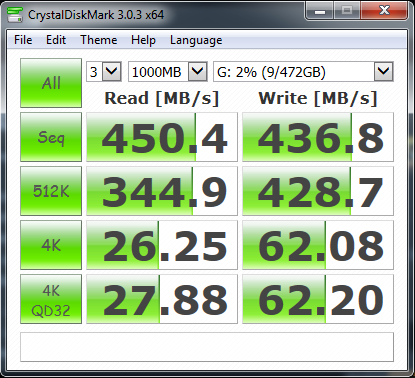CRYSTAL DISK BENCHMARK VER. 3.0 X64
Crystal Disk Benchmark is used to measure read and write performance through sampling of random data which is, for the most part, incompressible. Performance is virtually identical, regardless of data sample so we have included only that using random data samples.
And the trend continues with Crystal Disk Mark… We are seeing the rated 450MB/s read and a high of 436.8MB/s write. Also, note the 4k read and write speeds that are much higher than typical external USB drives.
The toughest benchmark available for solid state drives is AS SSD as it relies solely on incompressible data samples when testing performance. For the most part, AS SSD tests can be considered the ‘worst case scenario’ in obtaining data transfer speeds and many enthusiasts like AS SSD for their needs. Transfer speeds are displayed on the left with IOPS results on the right.
Our AS SSD result provided a Total Score of 319. The SSD2go Pocket reached a max of 427MB/s and 407MB/s for sequential read and write tests. 4k results are also very similar to CDM. In the IOPS we see it reaches a max of 13,873 read IOPS and 17,321 write IOPS, considerably less than the rated spec.
ANVIL STORAGE UTILITIES PROFESSIONAL
Anvil’s Storage Utilities (ASU) are the most complete test bed available for the solid state drive today. The benchmark displays test results for, not only throughput but also, IOPS and Disk Access Times. Not only does it have a preset SSD benchmark, but also, it has included such things as endurance testing and threaded I/O read, write and mixed tests, all of which are very simple to understand and use in our benchmark testing.
 Finally, we conclude our benchmark testing with Anvil. The max sequential reads are just shy of the rated 450MB/s read, reaching 428MB/s, however, write speeds seem to still be strong at 418MB/s.
Finally, we conclude our benchmark testing with Anvil. The max sequential reads are just shy of the rated 450MB/s read, reaching 428MB/s, however, write speeds seem to still be strong at 418MB/s.
REPORT ANALYSIS AND FINAL THOUGHTS
From a very gentle vapor phase soldering method to the use of medical technology production standards, the Angelbird SSD2go Pocket’ production is intense. Some of the quality controls include automatic optical inspection, in circuit testing, and burn-in in a climate chamber. Every component and drive undergoes more pretesting and certification than you can shake a stick at. In our testing, the Angelbird SSD2go Pocket has performed nothing less than spectacular. Sequential read and write speeds were not only met, but exceeded as well.
After spending some time with this drive with use of several different workloads, I must say the SSD2go Pocket is a great external SSD. It feels amazing on your hands, it really does. You pick it up and it just oozes quality and precision craftsmanship. In practice, my backups are much faster due to its 400MB/s+ read and write speeds and my mind can be at ease knowing how rugged the drive is. I don’t need to worry about device theft, for the most part, as I can now keep this SSD on my person rather than stored away in a bag due to its compact size and light weight. And it is definitely not an eye sore with its anodized aluminum finish.
Oh, and if you were wondering, yes we did do some drop testing. The extreme testing video from earlier wasn’t a lie, this is a truly rugged drive.
If you are in the market for a fast, rugged, reliable, and easy to take along portable SSD, this one just may be the one for you. For us, we feel this drive deserves our editor’s choice award. An external drive such as this can’t be beat.
Check out the Angelbird SSD2Go Pocket on Angelbird website today!
 The SSD Review The Worlds Dedicated SSD Education and Review Resource |
The SSD Review The Worlds Dedicated SSD Education and Review Resource | 

The biggest advantage over the spinning hard disk, is, I think, the lower power demand. This means it can connect to a smartphone, tablet, etc – using just a USB (2 or 3) cable, without any other power source. Is this true, for simple read-writes?
I havent tried this with those cables…to a Smart phone.
I gave it a shot on my nexas 7. I couldn’t get my Android device to recognize/power up the drive with any of the USB mounting apps i tried.
Actually, some ssds have bigger power requirement than your standard 2.5″ 5400rpm drives. Lots of ssds can easily exceed 2.5W cap, usb2 offer in write intensive or random workload.
But its true, that in idle ssds tend to use less power.